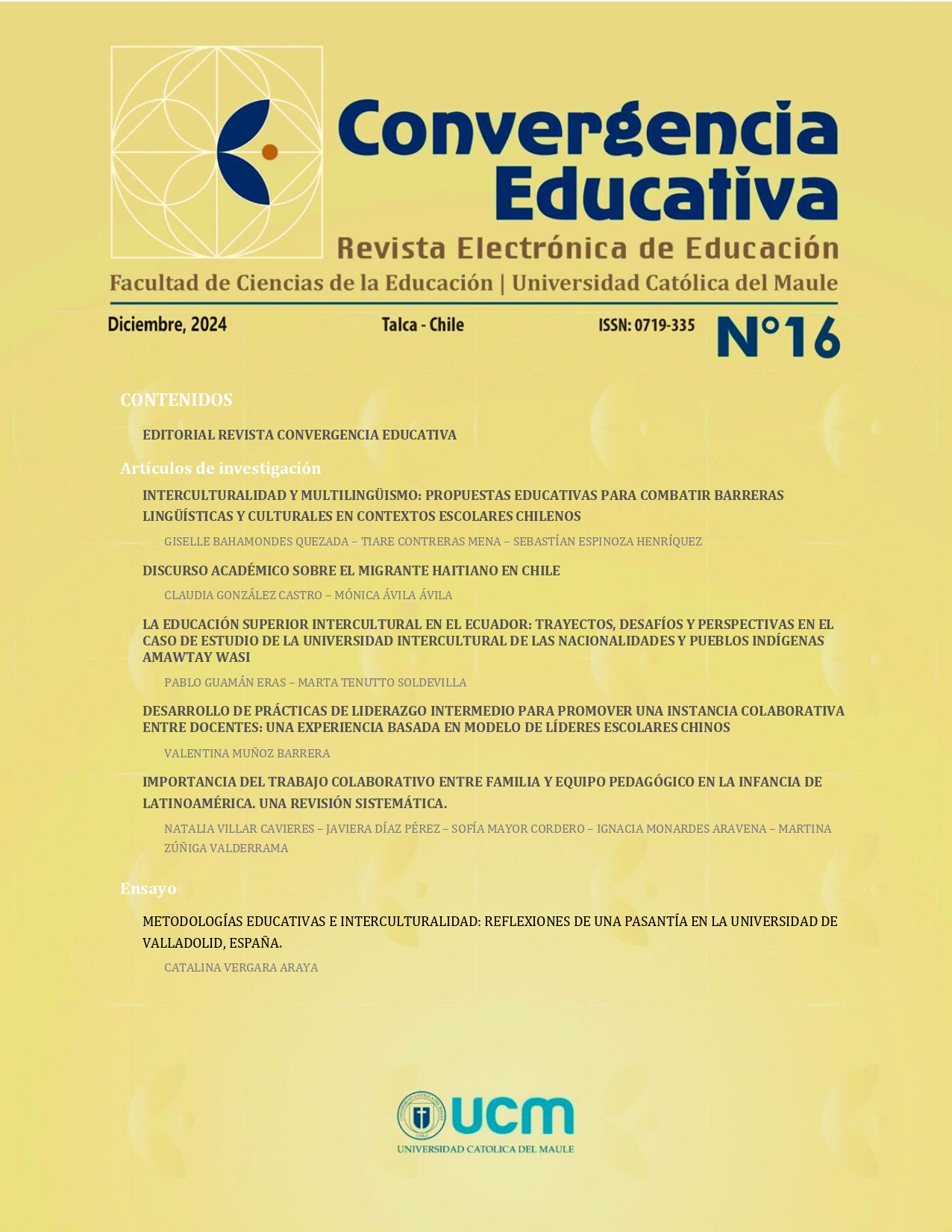Garbacz, A., Lee, Y., Hall, G., Stormshak, E., & Lee, L. (2021). Initiating Family–School Collaboration in School Mental Health through a Proactive and Positive Strengths and Needs Assessment. School Mental Health, 13, 667–679. https://doi.org/10.1007/s12310-021-09455-5
Gerdes, J., Goei, S., Huizinga, M., & De Ruyter, D. (2020). True partners? Exploring family-school partnership in secondary education from a collaboration perspective. Educational Review, 74(4), 805-823. https://doi.org/10.1080/00131911.2020.1778643
Hutton, B., Catalá-López, F., & Moher, D. (2016). La extensión de la declaración PRISMA para revisiones sistemáticas que incorporan metaanálisis en red: PRISMA-NMA. Medicina Clínica, 147(6), 262–26. https//:10.1016/j.medcli.2016.02.025
Lohmann, M., Hathcote, A., & Boothe, K. (2018). Adressing the Barriers to Family-School Collaboration: A Brief Review of the Literature and Recommendations for Practice. International Journal of Early Childhood Special Education, 10(1), 25-31. https://doi.org/10.20489/intjecse.454424
Madrid, R., Saracostti, M., Reininger, T., & Hernández, M.T. (2019). Responsabilización, obediencia y resistencia: perspectivas de docentes y padres sobre la colaboración familia-escuela. Revista Electrónica Interuniversitaria de Formación del Profesorado, 22(3), 1-13. https://doi.org/10.6018/reifop.389801
Mathers, A., Botting, N., Moss, R., & Spicer-Cain, H. (2024). Collaborative working between speech and language therapists and teaching staff in mainstream UK primary schools: A scoping review. Child Language Teaching and Therapy, 40(2), 120-138. https://doi.org/10.1177/02656590241232613
Ministerio de Educación, Chile. (2018). Bases Curriculares de Educación Parvularia. https://parvularia.mineduc.cl/wp-content/uploads/2019/09/Bases_Curriculares_Ed_Parvularia_2018-1.pdf
Paccaud, A., Keller, R., Luder, R., Pastor, G. & Kunz, A. (2021). Satisfaction With the Collaboration Between Families and Schools – The Parent’s View. Frontiers in Education, 6, 1-13. https://doi.org/10.3389/feduc.2021.646878
Padilla, C., & Madueño, M. (2022). Estrategias docentes para favorecer la participación familiar en educación secundaria: cruce de miradas. Información Tecnológica, 33(5), 49-60. https://dx.doi.org/10.4067/S0718-07642022000500049
Patrikakou, E. N., & Weissberg, R. P. (2001). Reducing the achievement gap in academic performance: What we can learn from social psychology. School Psychology Review, 30(3), 348-361.
Poliaková, A., Zemančíková, V., Tóblová, E., & Pisoňová, M. (2023). Class Management Focussing on Family-School Collaboration – Research Findings. European Journal of Contemporary Education, 12(4), 1388-1400. https:// 10.21125/edulearn.2020.1827
Razeto, A. (2018). Estrategias para promover la participación de familias en la educación de niños en escuelas chilenas. Educación e Investigación, 44, 1-20. http://dx.doi.org/10.1590/S1678-4634201844180495
Reynolds, A., Hayakawa, M., Ou, S., Mondi, C., Englund, M., Candee, A., & Smerillo, N. (2017). Scaling and Sustaining Effective Early Childhood Programs Through School–Family–University Collaboration. Child Development, 88(5), 1453–1465. https://doi.org/10.1111/cdev.12901
Romagnoli, C., & Cortese, I. (2015). ¿Cómo la familia influye en el aprendizaje y rendimiento escolar?. http://valoras.uc.cl/images/centro-recursos/familias/ApoyoAlAprendizajeEnLaComunidad/Fichas/Como-la-familia-influye-en-el-aprendizaje-y-rendimiento.pdf
Shyman, E., & Rodriguez, S. (2023). Bienvenido a Nuestra Escuela: A Thematic Exploration of Challenges and Potential Solutions to Creating Culturally Responsive Models of Parent-School Collaboration for Latino Immigrant Families. Journal of Latinos and Education. 23(2), 589-599. https://doi.org/10.1080/15348431.2022.2162056
Soutullo, O., Smith-Bonahue, T., Sanders-Smith, S., & Navia, L. (2016). Discouraging Partnerships? Teachers’ Perspectives on Immigration Related Barriers to Family-School Collaboration. School Psychology Quarterly, 31(2), 226–240. https://doi.org/10.1037/spq0000148
Superintendencia de Educación, Chile. (2017). Particularidades de la Educación Parvularia. https://www.supereduc.cl/wp-content/uploads/2017/12/%C3%9Altima-versi%C3%B3n_Particularidades-Educaci%C3%B3n-Parvularia_12_17_web.pdf
Tejada, K., & Vilca, R. (2019). Calidad del ambiente familiar y desarrollo psicomotor en niños y niñas de 3 a 5 años, de la institución educativa inicial de Socabaya. Tesis de Bachillerato, Universidad Nacional de San Agustín. https://repositorio.unsa.edu.pe/server/api/core/bitstreams/abc65564-6450-45c2-b896-ebe16b279c35/content


 https://orcid.org/0000-0002-2308-1689
https://orcid.org/0000-0002-2308-1689


